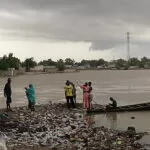Médecins Sans Frontières (MSF) has expressed concerns over the looming threat of malaria and cholera outbreaks in Maiduguri following the devastating floods that have unsettled the northeastern Nigeria town.
The medical aid organisation, in a statement sent to HumAngle on Friday, Sept. 20, called for increased support in water, sanitation, and medical care to protect a population already grappling with severe malnutrition and insecurity.
HumAngle reports how Maiduguri’s main earth dam, the Alau Dam recently overflowed, inundating Maiduguri and surrounding areas. The floods displaced nearly 400,000 people, forcing them into makeshift sites like public schools and closed IDP camps with inadequate sanitary facilities and scarce safe drinking water.
“We are very concerned about the precarious living conditions and the potential outbreaks of cholera and malaria,” said Dr. Issaley Abdel Kader, MSF Head of Mission in Nigeria. “We have seen some cases with clinical signs of cholera since the floods. Without increased support, especially in water, sanitation, and hygiene, the number of cases will likely rise.”
MSF teams have been actively assessing needs and providing essential services at several displacement sites, including water distribution and latrine repairs.
Dr Kader also said plans are underway to expand a pediatric facility by 100 beds and establish a cholera treatment center with scalable capacity.
While the Borno State government plans to close most displacement sites soon, maintaining only three for those without shelter, MSF says “the closure of most sites means that many will find themselves in a very vulnerable situation.”
“Prompt action is needed to improve hygiene conditions, including access to latrines, safe water, and mosquito nets.”
The flooding also exacerbates an already dire malnutrition crisis in Maiduguri.
“Admissions to nutritional facilities had just started to reduce when the flooding occurred,” noted Dr. Ashok Shrirang Sankpal, deputy medical coordinator for MSF Nigeria. “With markets and businesses heavily impacted, the harvest damaged, and livestock washed away, there is huge concern that the downward trend will reverse.”
This marks the second recent emergency response by MSF to flooding in northern Nigeria, following similar devastation in Gummi, Zamfara State. In both regions, MSF continues to deliver critical supplies and services to vulnerable communities.
